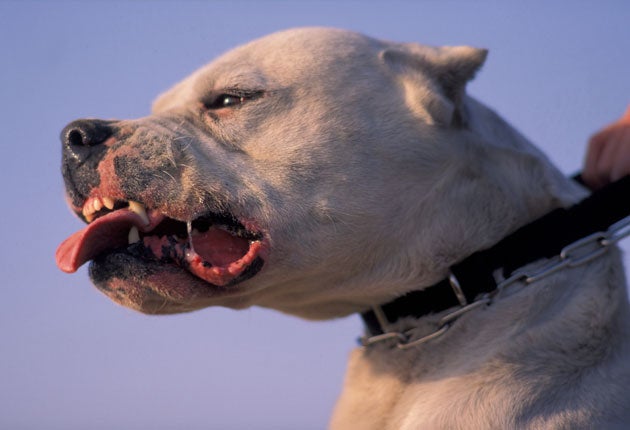'Devil dogs' cost police millions
As the number of seized dangerous pets rises, so do care costs before their fate is decided

Cash-strapped police forces are spending millions of pounds a year caring for dangerous dogs seized because they pose a threat to the public, while waiting – sometimes for years – for the courts to decide whether the animals should be destroyed.
Many UK police forces do not keep a record of the animals seized and kennelled, primarily under the Dangerous Dogs Act 1991, which outlaws four breeds of "fighting dogs". However, figures obtained by The Independent on Sunday show that the number of dogs confiscated and the cost of housing them in private kennels has soared over the past five years.
Records produced by just 15 forces showed the kennelling bill has increased from around £165,000 to more than £3m a year since 2005. The numbers of dogs confiscated because they were suspected of being a danger to the public or being a banned breed, rose from 236 to 1,786.
The cost of vets and kennelling to the Metropolitan Police alone grew from £150,000 to more than £2.5m, as the number of dogs seized rose from 35 to 1,152. One dog was left on "death row" for four years before its fate was decided.
Police chiefs have now asked ministers to reduce the financial burden, by sharing the costs between other organisations – and dog-owners – or by speeding up the legal process to determine the fate of dogs sooner.
A senior police officer claimed owners and lawyers often used all means at their disposal to "spin out" the legal process. The courts have allowed 1,324 "banned" animals to live by placing them on the Index of Exempted Dogs – enabling them to be returned to their owners on condition they are tattooed, neutered, micro-chipped, muzzled in public and have full insurance.
A spokesman for the Association of Chief Police Officers said last night: "We are very conscious of the issue of the costs of kennelling. It is something we have been pursuing with the Department of Environment, Food and Rural Affairs for some time. We are hopeful of making progress on it."
Aggressive dogs, often used as fashion accessories by young men, have sparked controversy in recent years, as the number of attacks on people has risen – up by 79 per cent in London, for example, over the past five years.
The NHS says the cost of treating dog attack victims has risen to £2.7m a year, while a conservative estimate suggests more than 5,200 people need hospital care every year.
Dogs have been responsible for a number of shocking attacks on children, including four-year-old John-Paul Massey, who was mauled to death by his uncle's illegal pit-bull terrier in 2009 while visiting the home of his grandmother in Wavertree, Liverpool.
The previous government responded to public alarm by launching a consultation on dog ownership. However, the coalition has yet to publish a response to the consultation, which ended nine months ago.
Luciana Berger, Labour MP for Wavertree, said last night: "Police forces are shelling out thousands, if not millions of pounds on kennelling. What makes the situation worse is that there is no provision in current legislation for the police to recover the money they've spent looking after the dogs, before the legal process has ended.
"This situation cannot continue, particularly at a time when the police are facing 20 per cent cuts. Police should be given the power to put down the puppies of illegal breeds; a nationally accredited register of dog experts would clarify who can identify a dangerous dog, and offences that take place on private land should be considered in the same way as those in public spaces."
